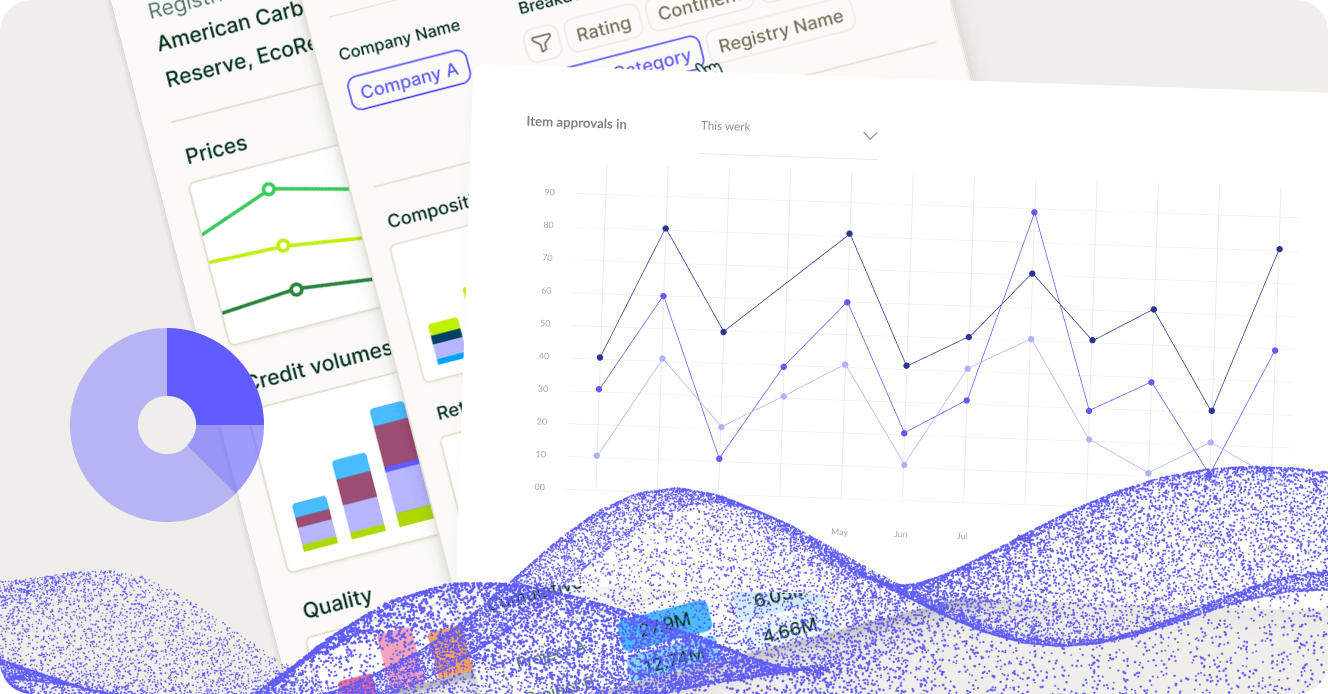“Over the years we’ve invested significantly in our field data team - focusing on producing trusted ratings. While this ensures the accuracy of our Ratings, it doesn’t allow the scale across the thousands of projects that buyers are considering.”
For more information on carbon credit procurement trends, read our "Key Takeaways for 2025" article. We share five, data-backed tips to improve your procurement strategy.

One more thing: Connect to Supply customers also get access to the rest of Sylvera's tools. That means you can easily see project ratings and evaluate an individual project's strengths, procure quality carbon credits, and even monitor project activity (particularly if you’ve invested at the pre-issuance stage.)
Book a free demo of Sylvera to see our platform's procurement and reporting features in action.
This blog was updated in January 2024 to reflect the latest announcements from the ICVCM.
For the voluntary carbon market (VCM), integrity is a key concern. One of the leading initiatives addressing the integrity of credits in the market is the Integrity Council for the VCM (ICVCM).
The ICVCM aims to develop and enforce minimum threshold standards for credit quality to ensure that investments in VCMs are channeled to effective climate solutions, and give buyers and the wider confidence in the integrity of the market.
This blog is your comprehensive explainer of the ICVCM. Read on to learn about the ICVCM’s process, guidance, what’s happened so far and what we expect over the next few years.
The CCPs
The ICVCM has developed 10 Core Carbon Principles which are the basis to determine if a carbon credit meets the integrity threshold. The CCPs ensure that credits create real, additional and verifiable climate impact with high environmental and social integrity. These include project design criteria such as additionality and permanence, good program governance and transparency, and wider market considerations such as no double counting and supporting the transition to net-zero emissions.
The IC-VCM has grouped the CCPs into three categories:
Governance – effective governance at the credit programme-level, tracking of credits through a registry system, transparency, third-party validation and verification.
Emissions impact – additionality, permanence, robust quantification, and no double counting.
Sustainable development – social and environmental safeguards, and avoid locking-in technologies or practices that are incompatible with reaching net zero GHG emissions by mid-century.
What makes a carbon credit CCP-approved?
For a credit to qualify as CCP-approved, it must meet the CCPs at two assessment levels:
1. Program level
The first level of assessment is for crediting programs, which the ICVCM defines as ‘standard setting program that registers mitigation activities and issues carbon credits’. These include Verra’s Verified Carbon Standard (VCS) and the Gold Standard.
The program-level assessment framework and procedure was released alongside the CCPs in March 2023. As part of this second release, a designated Assessment Platform has been launched for programs to apply for CCP assessment and eligibility.
2. Credit category level
This was the guidance released today. The Assessment Framework does not yet offer a singular definition of ‘Category’. A Categories Working Group (CWG) will be established by the ICVCM to review credit Categories based on public information and data from ratings agencies.
In the meantime, the Assessment Framework offers indicative lists of what constitutes Categories, such as:
- Conversion and Avoided Conversion (for example: wetlands and forests)
- Avoided Unplanned Deforestation
- Grid Connected Electricity Generation from Hydropower Units
- Agriculture Soil Carbon Sequestration
- Marine Ecosystem Restoration
The ICVCM’s Category-level Assessment Framework sets specific quality thresholds that projects in any given Category must meet, over and above the requirements for CORSIA, the UN’s offsetting mechanism for international aviation. Some notable threshold requirements that determine CCP-approval include:
- Robust Quantification: Baselines are required to be estimated conservatively to avoid risk of over-crediting.
- Permanence: Project proponents are required to commit to (at least) a 40-year monitoring period for Categories with high risk of reversal, and a buffer pool contribution of at least 20% of total carbon credits issued.
- Sustainable Development Benefits: Projects will be required to install robust social and environmental safeguards with an aim for positive impact on Sustainable Development Goals (SDGs). Category-level criteria for SDG impact is expected in the next CCP iteration.
The Assessment Framework also identifies Jurisdictional REDD+ as a Category that requires special consideration for Additionality and Permanence, given the nature of mitigation activity.
Under the CCPs, an eligible carbon crediting program will be able to issue approved carbon credits, as long as they belong to an approved Category.
Additional tagging
The CCP assessment will also surface key information relevant to buyers’ preferences, which the IC-VCM refers to as ‘CCP attributes’. These tags are:
- whether host country authorization and a corresponding adjustment are applied
- whether the project makes a voluntary contribution to the Adaptation Fund of the UNFCCC
- whether the project quantifies a positive contribution to the UN Sustainable Development Goals
What is not eligible under the CCPs?
With the ambition that all mitigation activities must contribute towards the overall goal of net zero emissions, the ICVCM has excluded some very specific Categories from CCP-Eligiblity, including
- Carbon credits that are issued ex-ante (where a carbon-crediting program supports both ex-ante and ex-post issuance, it shall have procedures in place to transparently identify units that are issued ex-ante and are thus ineligible under the ICVCM)
- Mitigation activities that
- Directly lead to an increase in the extraction of fossil fuels, such as Carbon Capture and Storage technologies used for Enhanced Oil Recovery;
- Relate to unabated coal-fired electricity generation;
- Involve any other unabated fossil fuel-powered electricity generation other than new gas-fired generation as a part of increased zero-emissions generation capacity in support of national low-carbon energy transition plans;
- Focus on road transport that rely on the continued use of solely fossil-fuelled engines.
What’s next?
The ICVCM will soon start assessing programs and categories. Programs can apply for assessment through the designated Assessment Platform. Programs eligible for CORSIA will be fast-tracked through the process, whereas assessment of non-CORSIA programs is expected to take longer.
As for the Category-level assessment, the ICVCM will publish Terms of Reference for the formation of the Categories Working Group (CWG), which will review and group different categories of carbon credits. Some Categories are expected to be fast-tracked through the assessment process, where there is clear evidence for or against their inclusion or where the categories are relatively homogenous. Other categories, such as REDD+, are expected to be more complex, requiring a deeper level of consideration by multi-stakeholder working groups.
The first CCP-approved credits issued by a CCP-Eligible crediting program are expected by the end of Q1 2024, although this date has previously been pushed back and might be again. The ICVCM has committed to transparency about its processes and the status of assessments. As part of this, the ICVCM will publish regular updates sharing the progress of its assessments of both programs and categories.
Following this, the next iteration of the CCPs and the Assessment Framework is expected to be published in 2025 and implemented in 2026. Some topics to be considered in the next iteration include longer monitoring and compensation requirements for permanence, as well as criteria for SDG impact measurement and risk assessment at the category-level.
Why does it matter?
Addressing the issue of low-quality carbon credits is an essential step to ensuring that VCMs achieve their potential impact in combating the climate crisis.
The ICVCM’s CCPs will work to raise minimum standards in the market. They intend for it to be an ongoing process of continuous improvement, where the bar is iteratively raised over time.
This will reduce the risk to buyers of purchasing low-quality credits, and provide clear guidance to standards to help them improve their processes to reduce the proportion of low-integrity credits in the market.
The guidance is already being adopted across the market. At the program level, Verra is currently holding a public consultation on their proposed changes to the VCS to bring the program into full compliance with the CCPs. At the credit category level, the VCMI’s Claims Code of Practice requires companies to purchase CCP-approved credits in order to make a VCMI Claim.
CCPs and carbon credit ratings
Once CCP assessments have been implemented across the market, won’t carbon credit ratings become redundant? This is a common misconception - on the surface both are assessments of quality, but actually CCPs and carbon credit ratings serve different purposes.
Read more in our blog about the CCPs and carbon credit ratings.
ICVCM has a valuable role to play in improving integrity and scaling VCMs. But as its assessments do not assess credit quality to the level of the issuing projects, they do not fully capture the range in quality found within standards, activity types and methodologies. Therefore it is likely that some good projects will be ruled out, and some bad projects will be approved.
The ICVCM's assessment is also ex-ante, and it would not account for a project's actual impact or confirm the quality of a carbon credit once it's issued.
Market players who are committed to achieving real climate impact and want to avoid reputational risk and wasted spend must conduct project-level due diligence. Beyond the binary CCP approval, carbon credit ratings give a nuanced insight into multiple aspects of quality at the level of individual projects.
CCPs and Sylvera ratings are complementary, rather than overlapping
At Sylvera’s Carbon Markets Summit, ICVCM Chair Annette Nazareth recognized the value of a number of organizations working together to increase transparency and accountability in VCMs:
“One positive outcome would be a race to the top, where companies are competing not only for robust disclosure, but robust practices.” — Annette Nazareth, IC-VCM Chair
In working towards this shared aim, we are able to achieve different things and serve different audiences. Sylvera will continue to engage with ICVCM to ensure VCMs have the biggest and most positive impact on the climate, nature, and local communities.















